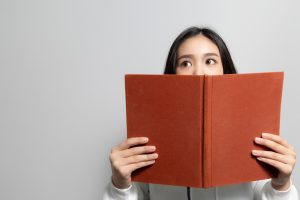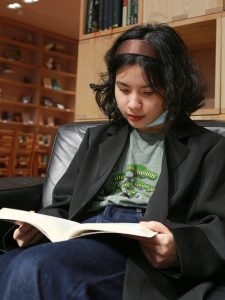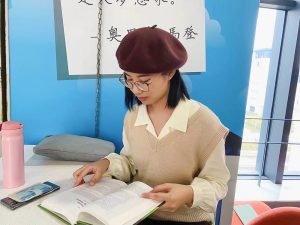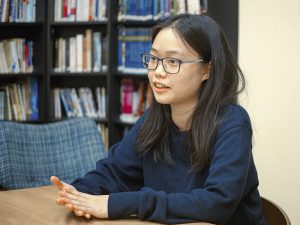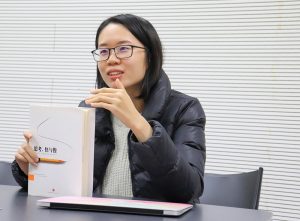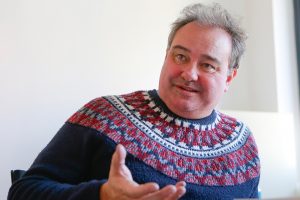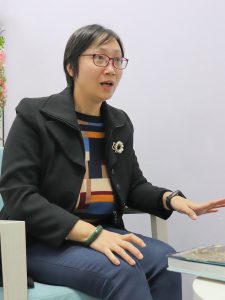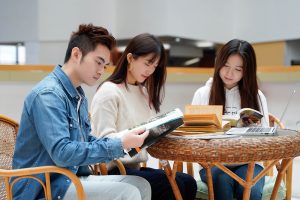Reading is a window to a new world. Although there are unexpected things to face in life, we can always find wisdom and consolation in books as they serve as a beacon of light to help us move forward in the midst of difficulties. We all have new plans for the new year. Will reading be one of your plans? In this issue, we have interviewed several UM members on how reading has inspired them and what new books they plan to read in the new year.
Discovering New Perspectives
Reading can enrich our spiritual world and help us discover new perspectives on life. Lori Chak, a third-year student in the Department of English and Lui Che Woo College, enjoys reading Charles Michael Palahniuk’s Haunted very much. She feels that the book provides her with a new perspective on life’s dilemmas. ‘Occasionally, people get tired of their own lives. They need to look at the lives of others and explore the possibilities of life,’ she says. ‘I really like the chapter titled ‘Slumming’, which tells the story of a rich man who pretends to be a homeless man and enjoys a new life under the flyover. When a man has nothing, he has nothing to fear.’ Chak also likes South American realist novels, and this year she plans to finish a book by the Peruvian writer Mario Vargas Llosa and read some poems. ‘Poetry will never make me tired,’ she says.
Jamie Wu, a first-year student in the Department of Accounting and Information Management and Shiu Pong College, who also loves poetry, considers a poetry collection by the Polish poet Wisława Szymborska to be one of the most influential books she read last year. ‘The pandemic has made me feel bad about some things, but Szymborska᾽s poems made me realise that I don’t have to obsess about how to get over these hurdles,’ she says. ‘I will accept their existence, look at difficulties from a different perspective, and find the positive and interesting side of them.’
Wu will turn a new page for herself this year by reading Being and Nothingness written by the French author Jean-Paul Sartre. ‘I used to find philosophy books difficult to read, but the idea of existentialism itself is very interesting to me,’ she says. ‘I would like to try to understand existentialism in depth through reading,’
Gaining Encouragement
Jiang Mengmeng, a doctoral researcher of biomedical sciences in the Institute of Chinese Medical Sciences, was in the middle of a one-year exchange programme at the National Cancer Institute under the National Institutes of Health in the United States when the COVID-19 outbreak started. His exchange programme focused on the treatment of solid tumours with TNFR2 antibodies targeting regulatory T cells. Because of the seriousness of the outbreak in the US, it was difficult for him to start his project and he encountered certain problems in his life. ‘Overseas Chinese students are grateful for the assistance of the Chinese embassy in the US, including the distribution of epidemic prevention supplies to students, which has been of great help to us,’ he says.
In the face of sudden challenges, Jiang says reading has given him great spiritual inspiration. Last year, he read a biography of the former US President Barack Obama, which made him realise that life cannot always be smooth sailing. ‘No matter what kind of hardships you’re in, if you have faith and the courage to work hard, you can eventually succeed,’ he says.
The year 2021 is the final year of Jiang’s PhD studies. This year, he plans to read Stephen Hawking’s The Universe in a Nutshell, hoping to expand his worldview and outlook on life. According to him, if there is a word to describe the year ahead, it would be ‘harvest’: ‘Because after three years of hard work and struggle for my PhD, I look forward to a rewarding new year.’
Kloe Lei, a third-year student in the Department of Psychology and Henry Fok Pearl Jubilee College, read Betty Smith’s book A Tree Grows in Brooklyn last year and was moved by it. ‘Despite all the hardships in her life, Francie, the protagonist of this novel, kept reading and eventually pursued her dream,’ says Lei. ‘I was a bit depressed and anxious when reading this book because of the pandemic, and Francie’s experience of growing up gave me the strength to face life with optimism.’ The next book on her list is Dear Ijeawele, or a Feminist Manifesto in Fifteen Suggestions by Chimamanda Ngozi Adichie, which Lei says will help her learn more about the true meaning of feminism.
Acquiring Knowledge and Wisdom
During the initial outbreak of COVID-19, there was a lot of fake news surrounding the pandemic that was difficult to prevent. It was against this backdrop that Sally Li, a master’s student of Chinese linguistics, read Thinking, Fast and Slow by the psychologist Daniel Kahneman. ‘Information flows so easily in today’s society,’ she says. ‘This book has taught me to look at information more critically, and how to distinguish between true and false information is an ability that we must have in modern times.’ Li has been a reader since she was a child, and this year she hopes to finish reading The Late Bloomer by Mo Yan, which is the writer’s first work since he won the Nobel Prize for Literature. ‘Reading is enjoyable and relaxing for me, and helps me broaden my horizons and develop critical thinking,’ she says.
Prof Matthew Gibson in the Department of English likes the non-fiction work In the Name of the People: Angola’s Forgotten Massacre by Lara Pawson, a former BBC correspondent for Angola. ‘What struck me most about this book is the persistence of a journalist who has spared no effort to find the truth, so that more people will understand and value this part of history again,’ says Prof Gibson.
At the moment, Prof Gibson is reading Lettres d’une Péruvienne, an epistolary novel written by the French writer Françoise de Graffigny in 1747. This book tells the story of a South American Inca princess who was abducted to France by Spanish colonists in the 18th century. Prof Gibson believes that the most obvious aspect of the pandemic is that technology has united the world as a whole, which is a stark contrast to the isolation of Zilia, the protagonist of this novel, who is taken to an unfamiliar place and can only write letters to her lover which appear to elicit no reply.
Dr Gong Yingxue, associate dean of Cheng Yu Tung College, who joined UM as a microbiologist in 2020, studied the psychologist Tony Attwood᾽s The Complete Guide to Asperger’s Syndrome last year. After reading the book, Dr Gong was enlightened: ‘The book reminds me of some of the friends or students I have come into contact with. It turns out that they did not behave in a shocking manner out of malice, but they just could not understand our conventional social skills and could not find a more appropriate way to express themselves.’ This year she plans to read Man’s Search for Meaning by the Austrian neurologist Viktor Emil Frankl: ‘This book is based on the author’s own experience in a concentration camp and may teach me how to transcend myself in the midst of extreme suffering.’
In the new year, let’s fill our reading lists with interesting books and embark on a journey of self-discovery!
Source: My UM ISSUE 100

